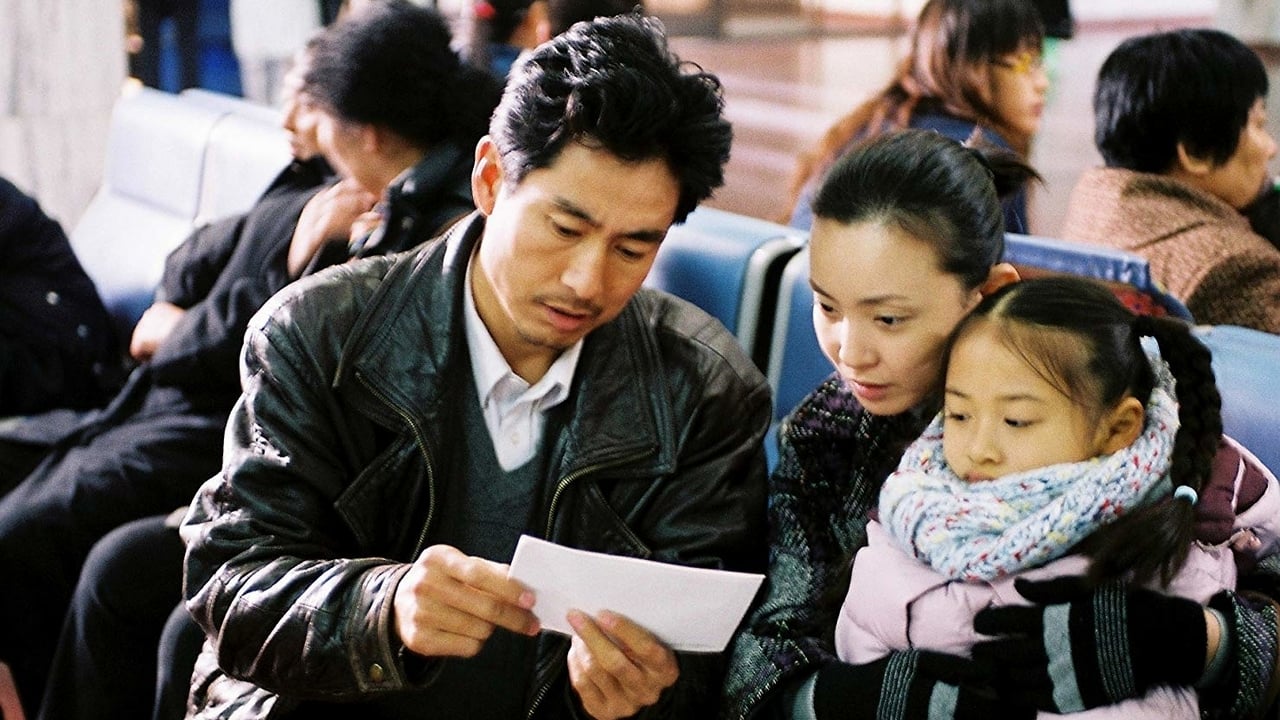

I watched this film with no distractions and found it gripping. During the movie, I found myself asking if I would/could do what the characters were thinking about. Always a sign of an engaging film.When the film begins, the character relationships are ambiguous. You might think you know what's going on, but as the film develops you realize you were wrong.This movie is not about leukemia. It is about moral dilemmas and how people cope with tough issues in their lives. It is a film about communication in its many forms.It's available right now on OnDemand if you have a provider that offers that service. Filmfest is offering it for free currently.Watch it if you have time without distractions.
... View MoreFilm Movement has made this film available, and I have always been impressed by their selections. Tonight a library in our area showed this movie, and I found it compelling to watch. It is true that several people in front of us got up before the end saying that the film was too long; I will leave it to more technical observers to decide what could have been shortened. The actors were all new to me. The scenes of modern China were very interesting in the context of the story.I felt this quiet film of everyday people in a difficult situation was very well written, directed and acted. It is another marker on the road of contemporary Chinese films like "Not One Less" and "Raise the Red Lantern." I believe it tells a story which many of us can understand. I would recommend it to you, I was glad to have the opportunity to see it.
... View MoreDespite all of his formal training under sex researcher Dr. Alfred Kinsey, the protagonist in T.C. Boyle's novel "The Inner Circle", comes to realize the folly of reconciling the sex act as the mere culmination of an animal instinct, a means to an end without strings, detached from such messy emotions like love, guilt, and jealousy. Gathered together with his colleagues and their wives up in Kinsey's converted romper room, John turns on his mentor when the esteemed author of "Sexual Behavior in the Human Male"(among others) tries to pair up with his wife during one of their communal experiments in loveless love. Sex, he realizes, staring at the doctor's erect member pointed towards his nude wife, indeed has consequences, contrary to what progressive thinkers may say otherwise. Sex without baggage, that's the ideal of a desperate mother in "Zuo you", a thought-provoking film about the politics of life and death that bears some passing thematic similarities with Lars Von Trier's "Breaking the Waves", in which the role of sex serves a higher purpose than the minor achievement of an orgasm. Whereas Bess(Emily Watson) plied her f***ery with random men to heal her paraplegic husband, Mei Zhu(Weiwei Liu) recruits her ex-husband in a last-ditch effort to help save their daughter's life by procreating a sex-child, a feeder sibling, whose umbilical cord blood would provide the needed match for a life-saving bone marrow transfusion(The fertility clinic has a policy on how many times a woman can be artificially inseminated.) "Zuo you" challenges the viewer into weighing the concerns of a worried parent against the potential rifts that these concerns entail. In other words: Is saving a child worth killing two marriages? "Zuo you" is about the most bizarre of social intercourses, in which parental love plays off against two instances of conjugal love.Unlike other films that deal with terminally ill children, "Zuo you" turns the fate of Mei Zhu's daughter into a secondary matter, after Mei Zhu makes her "indecent" proposal towards Xiao Lu(Jia-yi Zhang). The film's real drama comes from the purviewing of sex in strictly clinical terms, and seeing its participants more as love vigilantes than adulterers. While Mei Zhu's ex-husband is upfront with Dong Fan(Nan Yu) about his intentions, the mother keeps her appointed session with Xiao Lu, a secret from Lao Xie(Taisheng Chen), the man that the sick child calls "daddy". For Mei Zhu, it's a matter of biological function without moral implications; she treats sex as an entity independent from love, just like Dr. Kinsey. Depending on who you are, for the time being, Lao Xie may or may not fit the bill of cuckolded husband. This determination, is made more uniform, however, on the day of reckoning; first, by the filmmaker, through his rhetorical use of the "mis-en-scene", and then Mei Zhu herself, by way of epiphany.With each turn of the complying taxi driver, Mei Zhu leads her ex-husband deeper and deeper into a moral quagmire, as the vehicle delivers the noble fornicators towards their destination. The filmmaker obscures his subjectivity by employing this leisurely drive through the city landscape as a motif. "Zuo you" opens on this same sequence of windshield-framed imagery, when Mei Zhu, a real estate agent, accompanies her clients to inspect an available apartment. But this second drive, is far from being the ongoings of another normal day; the passengers' intent, far from being a normal course of action. In the bedroom, the woman's arm enters the screen to reveal the red sheets and pillowcases that was hiding beneath the gray bedspread. The moment Mei Zhu moans audibly after climax, she embodies the primary color of that bed sheet. In the next scene, she wears the sin on her blouse, as it shares the same scarlet hue(a subtle nod to Nathaniel Hawthorne's "The Scarlet Letter"). The mother is like a rape victim, in the sense that she feels the same guilt about deriving pleasure from a sexual encounter based on the pretense of a mechanistic process. When Xiao Lu rolls off her body, she has a look that's halfway between satiation and the self-realization that a transgression against Lao Xie just took place.
... View MoreI watched this movie as a substitution made in the last minute by the Hong Kong International Film Festival. In addition to the delight of finding that it was directed by Wang Xiaoshuai (whose "Qing hong" in 2005 won the "Prix du Jury" in Cannes), I also had the rare pleasure of going into a movie not knowing anything about it.As the story unfolded in Wang's usual slow pace, I was introduced to a modern-day couple in Beijing, graphic designer Lao Xie (Cheng Taisheng) and real estate saleswoman Mei Zhu (Liu Weiwei), together with 5-year-old daughter Hehe from her previous marriage. This would have been as happy as any cosmopolitan family you can find anywhere, with step- father and daughter regarding each other just as flesh-and-blood. The drama starts when Hehe is diagnosed with leukemia. Mei Zhu's divorced husband Xiao Lu (Zhang Jiayi), a building contractor, is called in right away. It is immediately apparent that while Mei Zhu is still a little bitter that the ex-husband who left her 4 years ago, the two men are on most civil terms with each other, while Hehe, only at 5, is quite mature and accepts the fact that she has two fathers the one looking after her (whom she loves), and the one who see her occasionally (whom she still likes). There is no villain in this movie.When tests show that neither of the blood parents is suitable as donor for bone marrow transplant, without which Hehe will have only two or three more years to live, Mei Zhu's sole purpose of living becomes saving the life of her daughter. Brought to understand that the best chance would be bone marrow from a sibling of the patient, she is convinced that having another child with her ex-husband is the only way to save Hehe.This is where the dramatic energy of the movie is unleashed. Xiao Lu is reluctant. He has also remarried, to a relatively younger woman, flight attendant Dong Fan (Yu Nan) who quite naturally wants to have a child with him. But as I said, there are no villains in this movie. Though not a saint (Lao Xie is close to being one), Dong Fan is not an unreasonable person. Her initial resistance to the scheme of having her husband impregnate his ex-wife is understandable. She eventually agrees, after meeting the little girl Hehe in person. The noblest sacrifice in from Lao Xie. Naturally he wants to have a child with Mei Zhu. National policy, however, allows only 2 children per family (used to be just one), meaning that if the scheme works, both children in his family will be from his wife's ex-husband. With the most cheerful disposition he can summon, he embraces the prospect, promising to love both children as his very own.The final dramatic turn comes when after in-vitro insemination failed repeatedly, Mei Zhu, in desperation and to Xiao Lu's shock, wants to go for the last resort - natural sex. This immediately brings to mind two similar (but also different) situations in movies: "Big Chill" (1983) and "Le temps qui reste" (2005).Before turning to the cast, a brief comment on the audio and visual experience. A good part of the movie is in quiet dialogue or complete (and at times lengthy) silence, punctuated only by occasional, scattered piano notes. For photography, instead of the mesmerizing, bleak but character-rich landscape of the Chinese countryside, we see mostly big cityscape, shot through what looks like a subdued light blue filter. Both approaches work well with the movie.The cast put in a great performance. Best is Liu Weiwei with her excellent portrayal of a woman with such a mild disposition that can almost be interpreted as timidity, until as a desperate mother, she delivers silent stares that can drive her ex-husband to do anything for her. Cheng Taisheng is heart-breaking as the husband whose selflessness is almost painful to watch. I didn't recognized Yu Nan who plays the young wife, until checking IMDb afterwards, as Tuya in "Tuya's marriage" (2006). Immediately my respect for this actress went up a few notches, recognizing the diversity of these two roles both of which she handles superbly. Completing the quartet is Zhang Jiayi, with his capable depiction of a man caught in a difficult situation, and the only character here that provides some brief moments of comic relief.Wang Xiaoshuai, just turning 40, is among a group contemporary Chinese directors who stand firmly on their principle of putting their art ahead of the box office. They deserve the respect received from those audience that still look for stimulating cinematic experiences, rather than the vulgar, cheap entertainment provided by garbage such as "Curse of the golden flower".
... View More